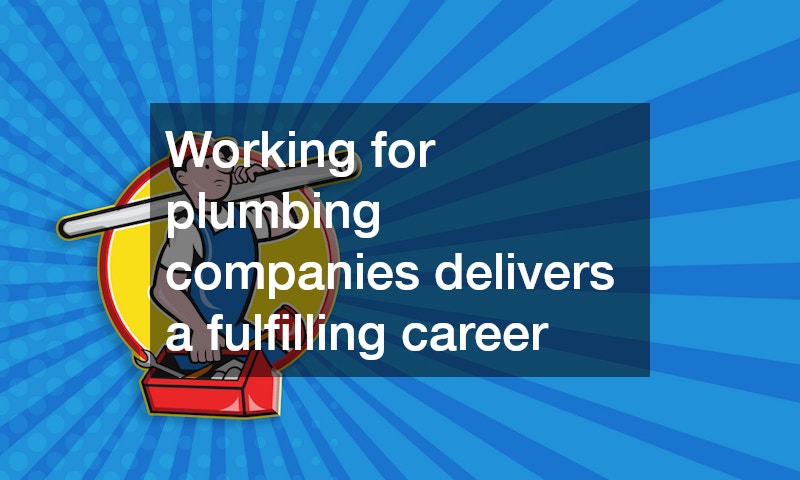Working for commercial plumbing companies can offer a rewarding career path for those interested in hands-on work and problem-solving. Plumbing is a profession that requires a solid understanding of various mechanical systems, customer service skills, and occasionally, some heavy lifting. It’s a dynamic field that blends technical expertise with the ability to quickly address and resolve issues, making it an ideal career for individuals who enjoy both a challenge and the satisfaction of helping others.
Before diving into this field, it’s crucial to understand what the job entails, the skills necessary, and the working conditions you might encounter. The plumbing industry offers a range of opportunities, from residential repairs to large-scale commercial projects, and can be a stable and lucrative career. This article will provide a comprehensive overview of essential things to consider before joining a plumbing company, including the educational requirements, potential career paths, and tips for excelling in the profession.
1. Understanding the Job Requirements
One of the first things to comprehend before applying to plumbing companies is the diverse set of responsibilities involved in the role. Plumbers are not just fixing leaks and unclogging drains; they also install new systems, conduct system maintenance, and follow complex plans and diagrams. A significant part of the job involves troubleshooting various problems, which requires a keen sense of analytical thinking. Moreover, understanding different types of pipes, valves, and fittings is paramount. Being familiar with the tools and technologies used in the trade will help you perform your duties effectively.
2. Acquiring the Right Skills and Qualifications
While it’s possible to enter the plumbing field with minimal formal education, plumbing companies typically seek candidates who have undergone vocational training or apprenticeships. These programs equip aspiring plumbers with essential skills such as soldering, threading, and blueprint reading. Many companies may prefer candidates with certifications or licenses, which can enhance employment prospects and lead to higher wages. Additionally, having strong math and problem-solving skills is beneficial, as these are frequently applied during the daily performance of plumbing tasks.
3. Embracing the Variety of Work Environments
Plumbers often work in a variety of settings, ranging from construction sites and commercial properties to residential homes. Each environment requires different approaches and problem-solving skills. For instance, working in a newly built site might involve more installation work, whereas residential settings can present more repair and maintenance tasks. Understanding the different environments and being adaptable to changing work sites is key. It’s also worth noting that plumbing work sometimes requires odd hours or emergency calls, demanding flexibility and commitment.
4. Prioritizing Customer Service
Though plumbing is a technical trade, it is fundamentally built on customer service. Interaction with clients is a regular part of the job, and effective communication skills are essential. Plumbers need to explain technical issues in layman’s terms, discuss possible solutions, and build rapport to ensure customer satisfaction. The ability to maintain professionalism, especially in customers’ homes, can lead to repeat business and enhanced company reputation. Providing polite and efficient service can set you apart in the competitive field of plumbing.
5. Staying Updated with Industry Standards and Safety Protocols
Safety is paramount when it comes to plumbing work. Familiarizing oneself with industry standards and adhering to safety protocols can prevent accidents and ensure quality workmanship. Plumbing companies often expect their employees to be aware of and comply with local plumbing codes, which govern installations and repairs. Moreover, advancements in plumbing technology mean that staying updated with new tools and methods is crucial for long-term success in the industry. Ongoing education and training can be beneficial, highlighting a commitment to both professional growth and customer safety.
Working for plumbing companies delivers a fulfilling career for those interested in practical, hands-on work. By understanding the job requirements, acquiring necessary skills and certifications, and embracing various working conditions, you can excel in this field. Prioritizing customer service and staying informed about industry standards will further enhance your career prospects. Entering the plumbing industry requires readiness for the challenges and opportunities that come with it, including the physical demands and the need for problem-solving skills. With dedication and the right preparation, a career in plumbing can be both lucrative and gratifying. Moreover, the growing demand for skilled tradespeople ensures job stability, and with the advancement of technology, there are even more opportunities for specialized work. By continually improving your expertise, you can progress in your career, potentially taking on leadership roles or starting your own plumbing business. The plumbing industry offers diverse and long-term career options, making it an excellent choice for those looking for a rewarding and sustainable profession.
.




